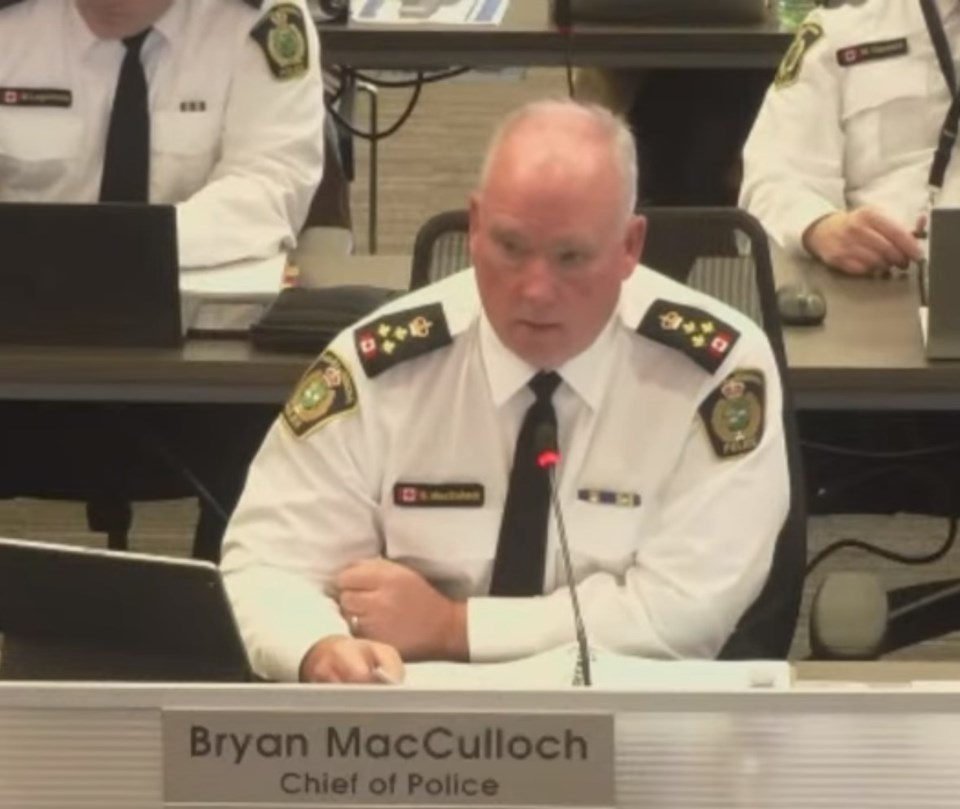Even though the Niagara Regional Police services board has trimmed its 2024 operating budget by $2 million, Niagara-on-the-Lake Lord Mayor Gary Zalepa wants more specific information Thursday when the agency returns to regional council with its revised spending plan.
In late November, Chief Bryan MacCulloch presented a proposed $190 million budget for the police, with a 7.1 per cent increase to what was allotted by the regional government for 2023.
Councillors voted for the budget to be sent back to the police services board and reconsidered by regional council Dec. 7.
On Monday, the police board met to finalize the changes it would be taking to regional council on Thursday, a budget of more than $188 million, representing a six per cent increase.
Board members were presented a number of mitigation steps, which included a transfer from the police contingency fund reserve of $500,000 to fund one salary day, to cover an additional day of payroll due to 2024 being a leap year.
Police also said it would adjust its fuel budget for a cost savings of more than $180,000 and defer requests for several new positions MacCulloch says are needed, such as one investigative inspector support position that would impact the budget by more than $238,000.
A total of 11 new cuts were listed in the police board’s report, one of them a recommendation about a staggered implementation of hiring 20 frontline officers — 10 of which would start on July 1 and the other half in September. This would reduce the 2024 budget by more than $380,000, MacCulloch said while presenting the report to the board.
One amendment made, brought forward by Port Colborne Mayor and former board chair Bill Steele, is that a cut being proposed actually be funded for six months in 2024 — a new crime analysis supervisor, which will have an impact of more than $82,000 on the 2024 budget, rather than twice that amount for a full year.
Before the board voted in favour of taking a six per cent increase back to the region’s budget review committee on Thursday, MacCulloch said the NRP can’t trim anymore.
“I believe any further cuts would potentially jeopardize public safety,” he said.
“What we’re looking for is really to keep the lights on,” MacCulloch added, cautioning that the new positions put on hold will need to be requested again in 2025.
“We’re only deferring them to another budget cycle,” he said.
When local detachments can’t meet their minimum staffing levels, which fluctuates on different days of the week and on weekends, officers are often redeployed to other areas of the region. This occurred 715 times in 2022 and on 752 occasions so far this year, causing a lot of “job-related burnout” within the NRP, McCulloch said.
But there are a handful of new positions that police are adamant they need, such as a uniform crime report clerk, a Community Oriented Response Engagement officer and two detective-constables for the Welland-Pelham district, a major crime analyst, two detective-constables to combat and educate about opioids, a constable for the NRP’s training unit, a network security administrator, and a communications training co-ordinator.
During the Nov. 23 regional budget meeting, Zalepa expressed concern about business cases related to the new positions not being part of the police’s presentation.
“I have yet to see what I was looking to see,” he said Tuesday when asked about the most recent cuts made by the police, unsure of whether this information will be provided when MacCulloch and his team are back in front of regional councillors on Thursday.
“I’ll be weighing my decision on that,” he said.
Zalepa understands that policing is very important to his own community and others in Niagara and that it comes with a cost, but he reiterated his position that more specifics are needed to approve funding these new hires.
“I need to see details of the cost to justify that,” he said.



